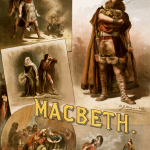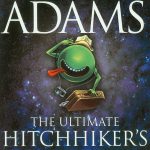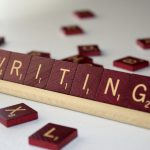Act 1, Scene 1 Summary.
Characters: The three witches.
Location: A desert place.
Time: Unknown
Events: The three witches plan to meet when again when the battle is won and lost. The plan to meet Macbeth on the heath before the setting of the sun.
Quote: “When the hurlyburly’s done When the battle’s won and lost.”
Act 1, Scene 2 Summary.
Characters: Duncan, Malcolm, Captain, Rosse, Angus, Lenox.
Location: A camp near Forres.
Time: Unknown
Events: A Captain from the battle comes bearing wounds and knowledge of the battle. He tells of wins and the rebels which the army has faced. He also tells of the bravery of Macbeth and acts of Scotlands traitor, Macdonwald and the other invader, Sweno, the King of Norway. Rosse and Angus finish the battle story for the weak Captain. Duncan is happy with the performance of his army and enraged by acts of Macdonwald. The traitor, Thane of Cawdor, also helps the king of Norway and Duncan claims that he will kill the Thane of Cawdor and no longer shall he receive his bosom interest.
Quote: “What bloody man is that?”
Act 1, Scene 3 Summary.
Characters: Witch 1, 2 and 3,
Location: A heath.
Time:
Events: Three witches meet on a heath and discuss how they have been causing havoc on sailors. Macbeth enters not knowing that the witches wait for him there. The witches tell of greatness which may befall on Macbeth and Banquo asks why they have not spoken of his future. They only mention that his child will become king. They meet Rosse and Angus who tell of the Thane of Cawdor’s acts and how Macbeth will take his role. Macbeth and Banquo begin to wonder if the witches tell the truth as one of their predictions come
Quote: “The Thane of Cawdor lives: why do you dress me in borrowed robes?”
Act 1, Scene 4 Summary.
Characters: Duncan, Malcolm, Donalbain, Lenox, Macbeth, Banquo, Rosse, Angus.
Location: Forres. A room in the King’s palace.
Time: Unknown.
Events: King Duncan learns of the death of the previous Thane of Cawdor and of how he confessed his treasons and dies in deep repentance. Duncan established that he is officially bestowing the heir of the throne to his oldest son, Malcolm. Macbeth states to the audience that he is going to do something bad in order to get rid of the Prince of Cumberland. He hopes that the gods will not view his black and deep desires.
Quote: “The Prince of Cumberland! – That is a step on which I must fall down, or else o’erleap, for in my way it lies.”
Act 1, Scene 5 Summary.
Characters: LADY MACBETH, MESSENGER, MACBETH.
Location: Inverness. A room in Macbeth’s Castle.
Time: Unknown.
Events: Lady Macbeth receives a letter from Macbeth the proficiency of the witches and fears that he has the ambition to become king but not the illness to complete the action. She wishes that she has those properties of a man to kill and to be surrounded by darkness just as Macbeth did when he learned of the news. She plans to kill Duncan when he comes to visit that night. Macbeth dismisses the idea when she speaks of it to him.
Quote: “All that impedes thee from the golden round”
Act 1, Scene 6 Summary.
Characters: DUNCAN, MALCOLM, DONALBAIN, BANQUO, LENNOX, MACDUFF, ROSS, ANGUS, and Attendants.
Location: The same. Before the castle. Hautboys and torches.
Time: Unknown.
Events: Duncan and Banquo arrive at Macbeth’s castle and Duncan praises the castle and says that it has a pleasant aroma and feel to the place. Banquo then continues the appraisal but it feels as though he takes it too far as if he knows something which Duncan doesn’t, which we as the audience know that he knows of the witches and Macbeth likely intentions. Lady Macbeth then greets them as if nothing is wrong yet she is planning something very sinister.
Quote: “This castle hath a pleasant seat”
Act 1, Scene 7 Summary.
Characters: MACBETH and LADY MACBETH.
Location: The same. A court within the castle. Hautboys and torches.
Time: Unknown.
Events: Macbeth sits somewhere in his castle contemplating the murder of King Duncan. He thinks of the consequences and how it would be bad hospitality if he were to kill Duncan. Lady Macbeth comes in and gives him a tongue lashing. She then says that if Macbeth can’t keep his vow he is not a man. Macbeth finally resolves that he will follow through with the murder.
Quote: “Vaulting ambition, which o’erleaps itself”
Act 2, Scene 1 Summary.
Characters: BANQUO, FLEANCE, and MACBETH.
Location: The same. A court within the castle.
Time: Unknown.
Events: Banquo and his son Fleance are in the courtyard talking, Macbeth enters and Banquo tells him that he cannot sleep and has dreamt of the three sisters. Banquo suggests that the witches speak some truth like when he become Thane of Cawdor. Macbeth states that he hasn’t thought about it since their encounter in the woods. MALady Macbeth rings the bell to indicate that all the chambermaids are asleep. Macbeth finally gets the mindset to kill Duncan and strides towards his chamber.
Quote: “Is this a dagger which I see before me,”
Act 2, Scene 2 Summary.
Characters: LADY MACBETH, MACBETH.
Location: The same.
Time: Unknown.
Events: Lady Macbeth is alone on stage and says that she has drugged the guards and would have killed the king herself if he hadn’t looked like her father, apparently now she’s all about her values. Macbeth comes in with blood on his hands and still grasping the murder weapon, Lady Macbeth has to plant it herself. Macbeth is disturbed that he can’t say amen or god bless us because he has killed his soul. Macbeth already regrets his murder of the King.
Quote: “Wake Duncan with thy knocking: I would thou couldst!”
Act 2, Scene 3 Summary.
Characters: PORTER, MACDUFF, LENOX, MACBETH, LADY MACBETH and DONALDBAIN.
Location: The same.
Time: Unknown.
Events: A funny interlude follows the murder of Duncan, true to Shakespeare’s style. The porter who’s supposed to answer the door makes jokes about “Hellgate”. Macduff and Lenox come through the door. Macbeth comes out and makes innocence small talk with them. Lenox tells Macbeth that it was a rough night with possible earthquakes. Macbeth responds to this by only saying “Yup, it was a pretty rough night”. Macduff finds the King dead, Lennox believes that it was the dead guards with blood and the dagger in the hand. Macbeth says that he killed them out of love for the King. Lady Macbeth faints. Donaldbain and Malcolm privately discuss that they should probably run.
Quote: ” ‘T was a rough night. ”
Act 2, Scene 4 Summary.
Characters: OLD MAN, MACDUFF, and ROSSE.
Location: The same.
Time: Unknown.
Events: Rosse talks with an Old man who is disturbed by the night unnatural events. Rosse says that the heavens are obviously disturbed as it is the middle of they day yet it is still dark. They give the example of a mousing owl killing the bird of prey, Hawk. Macduff arrives and says that the blame is placed on the guards Macbeth killed but it is though they were bribed by Donaldbain and Malcolm. Macbeth is off to Scone to be made the king.
Quote: “And yet dark night strangles the traveling lamp.”
Act 3, Scene 1 Summary.
Characters: BANQUO, MACBETH, LADY MACBETH, LENOX, ROSSE
Location: Forres. A room in the palace.
Time: Unknown.
Events: Banquo is alone on stage and he is suspicious of Macbeth. He pipes down when Macbeth and Lady Macbeth enter. Macbeth sweet talks him and invites him to dinner. Banquo says that he is busy, going for a horse ride. Macbeth asks if his son will be going with him and Banquo tells him he will. Macbeth does a speech to himself on why it is right to kill his friend Banquo. He believes that he has done the hard work and Banquo doesn’t deserve the legacy. Two men are brought in. Macbeth tells the two murders that Banquo has caused them all their misfortune and he is their enemy. They say they are only men and Macbeth uses his wife’s technique saying that they are not men if they’re not brave enough to kill for their own benefit. He tells them to kill his son aswell and then gets ready for his dinner party.
Quote:
Act 3, Scene 2 Summary.
Characters: MACBETH, LADY MACBETH, a SERVANT.
Location: The same. Another room.
Time: Unknown.
Events: Lady Macbeth asks servant if Banquo has gone and he says that he has left. She then gets the servant to get Macbeth. Macbeth says that he has only scorched the snake not killed and that Duncan doesn’t have to worry about loose ends. Lady Macbeth tells him to chill out. He says that if Banquo and his sons are living, his mind is full of scorpions. Macbeth states that he is going to do something bad and Lady Macbeth asks what it is, Macbeth dodges the question and says that he will tell her after it is done to impress her. Macbeth appeals to the night’s black agents to do their thing and they both exit.
Quote: “We have scorched the snake, not killed it”
Act 3, Scene 3 Summary.
Characters: 1 MURDERER, 2 MURDERER, 3 MURDERED, BANQUO, FLEANCE.
Location: The same. Another room.
Time: Unknown.
Events: Banquo is killed by the 3 murderers and his son Fleanace fled and survives.
Quote: “O’ treachy! Fly, good Fleance
Act 3, Scene 4 Summary.
Characters: MACBETH, LADY MACBETH, LENNOX, ROSSE, lords and attendents.
Location: The same.
Time: Unknown.
Events: Macbeth greets the guests. Murderer 1 comes in and tells Macbeth that they have killled Banquo but Fleance escaped. Macbeth sees Banquo’s ghost and doesnt know that no one else sees him. The ghost sits in Macbeths seat. He goes crazy and Lady Macbeth covers for him. Lady Macbeth asks if he is man again and the ghost comes back and Macbeth continues to look crazy. Lady Macbeth tells the worried lords to leave straight away. Macbeth wonders why Macduff wasnt there and Lady Macbeth tells him to go to sleep.
Quote: “Strange things that i have in my head, that will to hand”
Act 3, Scene 5 Summary.
Characters:
Location: The same.
Time: Unknown.
Events: The witches meet again and this time with Hecate. Hecate is annoyed that they meddled with Macbeth without her but she says it in rhyme and this could indicate that she is very powerful. She will clean up this mess and she will see them in the morning with Macbeth.
Quote: “As by the strength of their illusion, shall draw him on to his confusion”
Act 3, Scene 6 Summary.
Characters:
Location: The same.
Time: Unknown.
Events: Lennox is suspicious of Macbeth and the murders. Macduff has gone to England to try and convince the King Of England, with Malcolm, to join the battle against Macbeth, the tyrant.
Quote: “Whom this tyrant holds due of birth”
Act 4, Scene 1 Summary.
Characters:
Location: The same.
Time: Unknown.
Events:
Quote:
Act 4, Scene 2 Summary.
Characters:
Location: The same.
Time: Unknown.
Events:
Quote:
Act 4, Scene 3 Summary.
Characters: MALCOLM, MACDUFF, ROSSE.
Location: England. A room in the palace.
Time: Unknown.
Events: Malcolm and Macduff are talking in the palace in England. Bad things are happening in Scotland, Malcolm says he will avenge them. They both have a mutual hatred for Macbeth. Malcolm is suspicious why Macduff is in England and has left his family alone. Malcolm tests Macduff by saying that he is worse than Macbeth. Macduff says that no one is worse than Macbeth. He says that he would “rape” any woman says no to him. Macduff says that he is worthy of being King and that there is enough woman to satisfy his needs as King. Malcolm says that he should have the following things that Kings have but he does not. He says all good features of a person. He says that if he were King he would turn the world to chaos. Macduff says that after all of that he is still more worthy than Macbeth and he will have the support of the country. Malcolm says that he is lying and that he has never even had sex and he has never lied. A doctor enters and exits. Rosse enters and tells them that everyone is sick and dying and dead is everywhere. Macduff asks of his wife and his children. Rosse says that they are well and well at peace. Macduff tells him to stop holding back and tell him truly. Rosse avoids the question. People would fight against Macbeth for Malcolm. He says he’s got something bad to say. He has withheld the information. He is told that his whole family is dead, wife, kids, servants. He says to come and fight. Macduff blames himself. We shall use your anger.
Quote: “Our country sinks beneath the yoke” Extended Metaphor. Treated as if the country is if it is an animal. It weeps, bleeds and gets gnashed every day.
Act 5, Scene 1 Summary.
Characters: DOCTOR, GENTLEWOMAN, LADY MACBETH.
Location: Dunsinane. A room in the castle.
Time: Unknown.
Events: Doctor and Gentle Woman talking about Lady Macbeth sleep talking about things she shouldn’t. She won’t sleep in dark anymore, she is always scared. She is doing nervous things such as rubbing her hands all the time. Lady Macbeth says that she has no one to fear, she is the most powerful in the land. She says that she still has blood on her hands and she is trying to rub it off her hands. This metaphor has continued from Macbeth saying that he will never get rid of the guilt and blood. The Doctor and Gentle Woman have heard something that they know that they shouldn’t and they are scared. They can not heal her from this so-called disease of guilt. She says that Banquo is dead and she is going to bed. Lady Macbeth is losing her mind.
Quote: “What’s done cannot be undone” Famous Macbeth quote which is still used a lot today.
Act 5, Scene 2 Summary.
Characters: MENTETH, ANGUS, CATHNESS, LENOX, and soldiers.
Location: The country near Dunsinane.
Time: Unknown.
Events: A bunch of Scottish noblemen meets near Macbeth’s castle. The British army is close behind led by Malcolm and Macduff. Menteth says that Macbeth only has his own interests and everyone agrees he should go.
Quote:
Act 5, Scene 3 Summary.
Characters: MACBETH, SEYTON, and servant and doctor.
Location: Dunsinane, a room in the castle.
Time: Unknown.
Events: Macbeth is assuring himself. Servant enters. Macbeth insults him. He is told that there are 10,000 soldiers outside. Macbeth insults him again about being scared, over and over again. Macbeth realized that he not going to have an honourable life as he grows old. Seyton enters. Macbeth says that he will fight till the end. He asks how Lady Macbeth is going. The doctor says she is going crazy. Doctor replies that she has to fix herself. And by the way, do you have means to purge England from the Scottish Country Side.
Quote:
Act 5, Scene 4 Summary.
Characters: MALCOLM, SIWARD and his SON, MACDUFF, MENTETH, CATHNESS, ANGUS, LENOX, ROSSE and SOILDERS, marching.
Location: Country near Dunsinane. A wood in view.
Time: Unknown.
Events: Soldiers will cut down trees to hide their real numbers. Many of Macbeth’s men have destroyed him and those left do not believe in the cause. Macbeth is willing to let them come up to Dunsinane thinking the prophecy will protect him and the castle.
Quote:
Act 5, Scene 5 Summary.
Characters: SEYTON, MACBETH, MESSENGER, and soldiers.
Location: Dunsinane. Within the castle.
Time: Unknown.
Events: Macbeth is still in the castle and is ready for war. He thinks that the castle will hold up. Lady Macbeth kills herself. Macbeth delivers soliloquy which is famous around the world and could be seen as Shakespeare himself talking to the audience. A messenger tells him that the wood is moving which is where the witches said he will be defeated.
Quote: ” Life’s but a walking shadow, a poor player That struts and frets his hour upon the stage, And then is heard no more: it is a tale told by an idiot full of sound and fury, Signifying nothing. ”
Act 5, Scene 6 Summary.
Characters:
Location:
Time: Unknown.
Events: Malcolm, Siward, and Macduff arrive with their army still covered in trees at the castle. Siward and his son will lead, the trees are dropped on battle begins.
Quote:
Act 5, Scene 7 Summary.
Characters:
Location:
Time: Unknown.
Events:
Quote:




